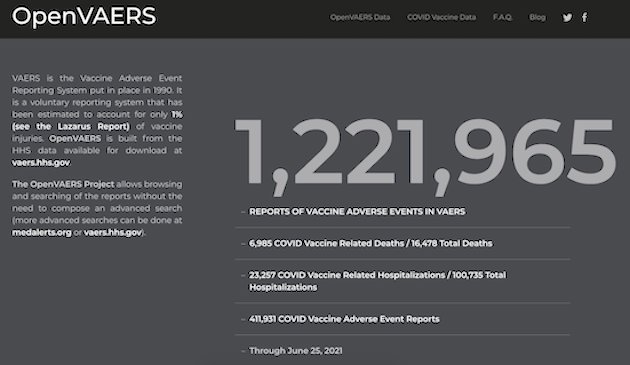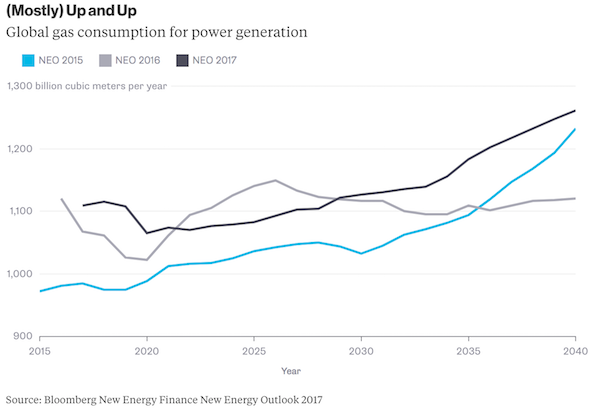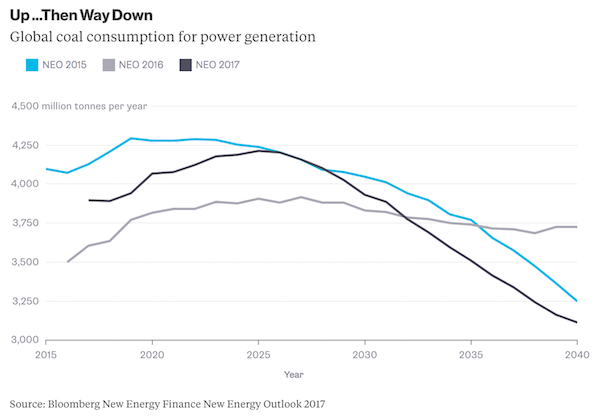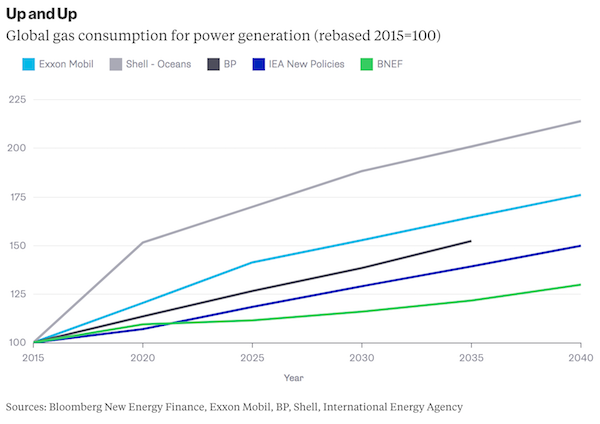
Jean-Michel Basquiat Irony of the Negro Policeman 1981

SHOCK REPORT: ⚠️ FBI may have RAIDED Mar-a-Lago in search of missing binder that purportedly proves CIA set up the Russia Collision narrative..
1 day before leaving office, Trump declassified, crossfire hurricane..
The Binder is now MISSING.. https://t.co/4x7WVaP7FP pic.twitter.com/dy8TDa6xQ0
— Chuck Callesto (@ChuckCallesto) February 14, 2024

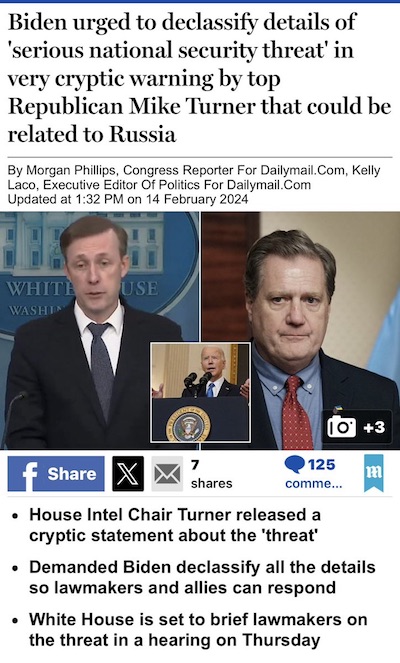

America is apparently facing a national security threat from Russia that’s so terrifying, our own government said they couldn’t tell us what it is. Democrats are saying it’s serious, but there’s no need to panic. Something about today’s news cycle seems deliberate. I hope I’m… pic.twitter.com/0a5xuROhKv
— Jesse Watters (@JesseBWatters) February 15, 2024

Ron Paul
Trump Was Right — They Were Spying On Him!
Watch the whole show here: https://t.co/kxR6HQUG2a pic.twitter.com/O81bNp8Jh6
— Ron Paul (@RonPaul) February 14, 2024



Dugin Pepe
https://twitter.com/i/status/1757773972618223949

Rickards gold
Here are the real gold powers ranked by their ratio of gold to GDP. The ranking shows how much real money each has to support its economy:
Russia – 8.3%
Switzerland – 7.6%
Italy – 7.4%
France – 5.3%
Germany – 4.9%
U.S. – 1.9%
India – 1.4%
Japan – 1.3%
China – 0.80%
UK – 0.60% pic.twitter.com/3e6qliPUBK— Jim Rickards (@JamesGRickards) February 14, 2024


Kim Dotcom: Zelenskyy released a helpful guide on who to follow if you want to learn the truth about the failing US proxy war in Ukraine. He calls it pro-Russian disinformation but he’s just angry that these experts constantly reveal the truth about how badly Ukraine and the West are losing.

Elon
“To anyone I've offended, I just want to say, I reinvented electric cars and I’m sending people to Mars in a rocket ship.
Did you think I was also going to be a chill, normal dude?”
Elon Musk pic.twitter.com/E3YU2i4nEz— Tesla Owners Silicon Valley (@teslaownersSV) February 15, 2024


This is an existential threat to the US. If this cannot be solved according to the law(s), the Union will dissolve.
Start with Obama, he is behind it all. But he hardly gets mentioned.
• US Spies Behind ‘Russiagate’ Conspiracy (RT)
The US intelligence community inappropriately used foreign allies to target Republican presidential candidate Donald Trump’s campaign to set up the ‘Russiagate’ conspiracy ahead of the 2016 election, according to a trio of investigative journalists. Michael Shellenberger, Matt Taibbi and Alex Gutentag – of ‘Twitter Files’ fame – published the first part of an investigation on Tuesday, in which they claim the so-called ‘Five Eyes’ were operationalized against Trump staffers, citing anonymous sources close to the House Intelligence Committee. According to their report, President Barack Obama’s CIA Director, John Brennan, had sent America’s partners – the UK, Canada, Australia, and New Zealand – a list of 26 Trump associates to target with data collection, misinformation and manipulation. The Russiagate conspiracy involved multiple failures across western media networks to critically assess US intelligence claims that Russia had interfered in the 2016 US presidential election.
A 2018 Pulitzer prize was awarded to Washington Post and New York Times journalists for their reporting on what was later to exposed as a false story. “They were making contacts and bumping Trump people going back to March 2016,” said a committee source. “They were sending people around the UK, Australia, Italy — the Mossad in Italy. MI6 was working at an intelligence school they had set up,” the journalists claim. Officially, the FBI only started looking into the Trump campaign that summer, after an Australian diplomat reportedly overheard an aide mention Russia. If confirmed, these findings would demonstrate that the US intelligence community had worked for months before that to set up just such a pretext. In a statement to the investigative journalists, the FBI said it had made “missteps” in the 2016 and 2017 investigation of the Trump campaign, but has since implemented reforms to prevent it from happening again.
“The allegations that GCHQ was asked to conduct ‘wiretapping’ against the then president-elect are nonsense,” a spokesman for the British surveillance agency said. “They are utterly ridiculous and should be ignored.” Shellenberger, Taibbi and Gutentag said they had never asked the GCHQ about “wiretapping.” According to Shellenberger, there is a “10-inch binder” containing previously unknown documents about the intelligence community’s surveillance of the Trump campaign. The 45th US president had ordered these documents declassified, but they went missing instead. In a Fox News appearance on Tuesday evening, Shellenberger suggested the FBI’s August 2022 raid on Trump’s Mar-a-Lago resort may have been related to the missing binder.
After the US intelligence community created a pretext for investigating Trump for ‘ties to Russia,’ they spied on his campaign – and then his presidency – using a falsely obtained FISA warrant. The warrant was based on the ‘Steele dossier,’ a file compiled by a British spy in the pay of Hillary Clinton’s campaign, through several intermediaries. The FBI knew the dossier was false as early as January 2017, but continued using the FISA warrant for almost a year thereafter. The FBI lawyer who altered evidence to obtain the warrant, Kevin Clinesmith, ended up sentenced to probation and his law license has since been restored.
According to CNN, one of the biggest "lies" that Trump told was that his campaign was spied on.
Imagine how many times they added this to their official "Trump Lie Count." pic.twitter.com/H8cXxeLYLY
— MAZE (@mazemoore) February 14, 2024
In case you missed this: How the CIA set up Trump, spied on him, and undermined his presidency. WATCH pic.twitter.com/BsTBmz4qIT
— Simon Ateba (@simonateba) February 14, 2024

“He was very concerned about having it and taking it with him because it was the road map” of Russiagate..”
• Part 2: US Government Hides Documents That Incriminate Intel Community (Public)
Part 2: U.S. Government Is Hiding Documents That Incriminate Intelligence Community For Illegal Spying And Election Interference, Say Sources. Authored by Michael Shellenberger, Matt Taibbi, and Alex Gutentag via Public substack,
Former CIA Director Gina Haspel blocked the release of “binder” with evidence that may identify her role in the Trump-Russia collusion hoax.
Last December 15th, as Americans decorated trees, lit Menorahs, and prepared to tune out for winter holidays, CNN ran an extraordinary article titled, “The mystery of the missing binder: How a collection of raw Russian intelligence disappeared under Trump.” Co-authored by Natasha Bertrand, the gargantuan expose claimed a mysterious “binder” of “highly classified information related to Russian election interference” went “missing” in the chaotic waning days of Donald Trump’s presidency in January 2021, raising concerns that some of America’s most “closely guarded national security secrets… could be exposed.” CNN and its intelligence sources meant “exposure” in a bad way. Sources have told Public and Racket, however, that the secrets officials worry might be “exposed” are ones that would implicate them in widespread abuses of intelligence authority dating back to the 2015-2016 election season.
“I would call [the binder] Trump’s insurance policy,” said someone knowledgeable about the case. “He was very concerned about having it and taking it with him because it was the road map” of Russiagate. Transgressions range from Justice Department surveillance of domestic political targets without probable cause to the improper unmasking of a pre-election conversation between a Trump official and Saudi Crown Prince Mohammed bin Salman to WMD-style manipulation of intelligence for public reports on alleged Russian “influence activities.” The CNN report claimed intelligence officials were concerned about the disclosure of “sources and methods that informed the U.S. government’s assessment that Russian President Vladimir Putin sought to help Trump win the 2016 election.” They should be concerned.
The story of how a team “hand-picked” by CIA Director John Brennan relied on “cooked intelligence” to craft that January 6th, 2017 Intelligence Community Assessment is the subject of tomorrow’s story, the last in this three-part series. Corruption, not tradecraft, is what officials are desperate to keep secret. The ”missing binder” story has several variants. Sources offer differing answers on the question of whether anything of consequence is missing. They give mixed accounts of Trump’s frantic last efforts to declassify Russia-related material. But nearly everyone Public and Racket spoke to agreed that the tale obscured a broader and more important story. Dating back to the release of the so-called “Nunes memo” in 2018 exposing the corruption of the FISA application process, senior intelligence officials, including Trump’s CIA Director, Gina Haspel, have repeatedly blocked attempts to declassify information about the Trump-Russia investigation.
They had good reason to obstruct the release of these documents. The documents in question are said to contain information about the legal justification for those investigations, or more specifically, the lack of justification, among other things. Should more of that information be made public, it might implicate a long list of officials in serious abuses. Questions like these may be answered if the 10-inch thick binder of sensitive documents about the origins of the Russia probe is made public. Fear for reputations and careers, not national security, is what has intelligence officials panicked. [..] Investigators wanted to declassify their findings before Trump left office, but the CIA “would not cooperate.” Investigators, a source told Public and Racket, “created a binder that blew up the assessment but couldn’t get it out because the CIA controlled it.”
Gorka
.@mtaibbi joins me on #AMERICAFirst One on One…we discuss the evidence of collusion between the Trump campaign and Russia, the plot against the president orchestrated by Obama, Brennan, and Comey, and the explosive revelations brought to light by new sources.
We also delve… pic.twitter.com/yZqiBpZDNn
— Sebastian Gorka DrG (@SebGorka) February 14, 2024
Obama
SPYGATE FLASHBACK | In 2020, Barack Obama characterized the Trump spying allegations as “absurd."
In this clip, Obama directly refutes the spying claims — as so “absurd" that “even Republican controlled committees who are looking into it have dismissed them."
He then goes on to… pic.twitter.com/b7otiPockm
— Western Lensman (@WesternLensman) February 14, 2024

“It’s election interference from one side that has been covered up and promoted as some kind of search for justice,” Kavanaugh asserted. “Now you have that side actually trying to prevent the same candidate […] from running again, and they get away with it.”
• Biden’s Dual ‘Big Guy’, Memory Scandals Will End His Presidency (Sp.)
On Tuesday, Hunter Biden’s ex-business associate Tony Bobulinski testified to Congress that US President Joe Biden is “the Big Guy” who was mentioned in an email that discussed “remuneration packages” for six people as part of a business deal with a Chinese energy company. The email included a line that said “10 held by H for the big guy?” According to US media, citing people familiar with the testimony, Bobulinski also said that he “personally met” Joe Biden in 2017 during the Milken Conference, just days before the email was sent. It has long been suspected that President Biden was “the big guy” referred to in the email, but Bobulinski’s testimony adds further evidence to back up that presumption. The elder Biden has repeatedly insisted that he did not discuss business with his son or his associates.
“It’s hard to fathom who the big guy could be but Joe Biden. So we’ve known about this,” independent journalist Dr. Jim Kavanaugh told Sputnik’s The Critical Hour on Wednesday. “[Bobulinski] confirms that the big guy is Biden, which means […] [Joe] Biden was getting paid from his son’s activities with [these Chinese businesses].” This, combined with the President’s cognitive problems that have become “impossible to deny” will cause him to step aside before this November’s Presidential elections. “He’s not going to be the Democratic nominee,” Kavanaugh asserted, adding that the only question left is “How much longer is he going to last as president?” Kavanaugh noted that Bobulinski’s testimony validates the IRS whistleblowers Gary Shapley and Joseph Ziegler, who claimed that politics caused the FBI to slowwalk the investigation into Hunter Biden. “It’s a mess,” he said. “But I don’t know where the Democrats think they can go with this, and how they think they can hang on.”
The election season with Biden will be a “fun ride” Kavanaugh said “trying to keep Biden out of the public spotlight enough so he won’t make a fool of himself, but in the public spotlight enough to make it seem like he’s still running the show,” adding that all the while Democratic leadership will be “trying to figure out what they’re going to go and with whom they’re going to replace him with.” Kavanaugh also discussed reports from independent journalists Matt Taibbi and Michael Shellenberger that the CIA allegedly used foreign intelligence agencies to illegally spy on people working for the Donald Trump 2016 Presidential campaign. “It’s election interference from one side that has been covered up and promoted as some kind of search for justice,” Kavanaugh asserted. “Now you have that side actually trying to prevent the same candidate […] from running again, and they get away with it.”

“..A recent poll by NBC revealed that only 28% of registered voters have a positive opinion of Harris..”
• Biden Must Be Removed – West Virginia AG (Sp.)
West Virginia Attorney General Patrick Morrisey has called on US Vice President Kamala Harris to declare Joe Biden physically unable to perform his duties as president. The demand was issued in a letter sent to Harris on Tuesday. Last week, a report by US Department of Justice special counsel Robert Hur described the 81-year-old president as an “elderly man with poor memory,” although he advised against prosecuting Biden over the mishandling of classified documents. Morrisey has now called on Harris to invoke the 25th Amendment against Biden and take over his role, arguing that Hur’s report “paints a clear picture of a President who is not up for the job” and stressing that his “cognitive decline is of great concern to Americans, especially during these times that our nation is falling crisis after crisis both here and abroad.”
“We need a president who is mentally fit,” the attorney general wrote, noting that over the past few months alone, Biden has repeatedly mixed up world leaders and political figures and has appeared to have difficulty speaking on basic issues. The 25th Amendment, adopted in 1965 following the assassination of President John. F. Kennedy, clarifies the succession in the event of the US leader’s sudden death or resignation, and allows the vice president to assume their responsibilities. Under Section 4 of the amendment, the vice president and the cabinet are also allowed to remove the president if he is deemed physically incapable of performing his duties but refuses to leave office. That power has thus far never been used.
In an interview with the Wall Street Journal published on Monday, Harris stated she is “ready to serve” and replace Biden if necessary, adding that she does not need to convince anyone of her ability to lead the country. A recent poll by NBC revealed that only 28% of registered voters have a positive opinion of Harris, compared to 53% with a negative view. Biden has vehemently denied concerns over his mental and physical health, and issued an angry rebuke of Hur’s description of him. “I am an elderly man and I know what I am doing,” Biden insisted at a press conference last week. Shortly afterwards during the same conference, he confused Egyptian President Abdel Fattah el-Sisi with the leader of Mexico. The president’s age has become a major concern among voters ahead of this year’s presidential election. According to ABC News/Ipsos poll published on Monday, as many as 86% of US voters believe that Biden is too elderly to serve another term in office.

“Neither Hunter nor James Biden have demonstrated any particular skill beyond an absence of inhibition and an abundance of appetite. What they have is “an interesting name,” and in Washington, that is enough.”
• Biden Associates Testify on the Influence Peddling of President, Family (Turley)
“An interesting name.” Those three words by Biden family associate Rob Walker could well be the epitaph for Hunter Biden and his uncle James Biden. Walker was explaining why Hunter was repeatedly pushed forward as the face of their pitches to the Chinese and other countries. In his interview with House investigators, Walker struggled to protect President Biden while confirming critical aspects of earlier testimony from associates such as Devon Archer that they were selling the “Biden brand.” That brand included Uncle James Biden, whom Walker described as “a snake.” Walker and his associates had a letter to the Chinese come from Hunter because that is what he thought the Chinese expected. He admitted that the Chinese were led to believe that they all worked for Hunter Biden. After all, he “had an interesting last name that would probably get people in the door.”
That “interesting name” is how a Beltway bandit avoids saying “influence peddler.” You are peddling the name — an effort that is reinforced when you repeatedly produce Joe Biden on speakerphone or he drops by lunches. It’s also the same name dropped when Hunter wanted to make sure the Chinese paid up, as revealed in the infamous WhatsApp message: “I am sitting here with my father and we would like to understand why the commitment made has not been fulfilled. Tell the director that I would like to resolve this now before it gets out of hand, and now means tonight. And, Z, if I get a call or text from anyone involved in this other than you, Zhang, or the chairman, I will make certain that between the man sitting next to me and every person he knows and my ability to forever hold a grudge that you will regret not following my direction. I am sitting here waiting for the call with my father.”
Yet whenever questions turned to the most incriminating messages, Walker shrugged. When asked about a reference to “the big guy” receiving 10% of a deal (an apparent reference to Joe Biden), Walker declined to say who the big guy was. When he was asked about Hunter’s repeated references to his father and calling his father “my chairman,” Walker insisted that “I don’t think that Hunter was healthy at the time.” Likewise, when Hunter says his father “vetoed the deal” on a proposed SinoHawk deal structure, Walker again said Hunter was not well. So Hunter was a legitimate businessman “with an interesting name” all the way up to the point that he made admissions on alleged influence peddling. He was then interesting but unhealthy.
Walker repeatedly emphasized that Joe Biden was not a direct part of these deals. While that is a political defense, however, it is not a legal one. As I have previously written, federal courts have long treated payments to family members as evidence of bribery and corruption. Indeed, I was lead counsel in the last judicial impeachment trial in the Senate, when Democratic senators voted to convict a judge on payments and gifts going to the children of a judge. Neither Hunter nor James Biden have demonstrated any particular skill beyond an absence of inhibition and an abundance of appetite. What they have is “an interesting name,” and in Washington, that is enough.

“.. Johnson said he will continue to insist on a meeting, adding that it is a “problem” if the Speaker of the House cannot sit down with the president.”
• Speaker Requested Meeting With Biden About Border, White House Rejected (Sp.)
US House Speaker Mike Johnson said on Wednesday that he has requested a meeting with President Joe Biden about border security, but that the White House has rejected his request. “I’ve been requesting a meeting with the president for weeks now, a month. I’ve been asking to sit down with the president to talk about the border and talk about national security, and that meeting has not been granted,” Johnson said during a press conference. Johnson said he will continue to insist on a meeting, adding that it is a “problem” if the Speaker of the House cannot sit down with the president.
House Republicans will insist on addressing the United States’ border security before sending aid to foreign countries, Johnson said. Earlier this week, Johnson said that he has no plans to bring a $95 billion supplemental funding bill passed by the US Senate to the House floor. The bill provides approximately $60 billion for Ukraine and $14 billion for Israel. However, a congressional source told Sputnik on Tuesday that House lawmakers may divide the legislation into separate portions in an effort to pass the measures.

“..in 1982, the Supreme Court held in Nixon vs. Fitzgerald that the president has “absolute immunity” from civil liability which extends to the “outer perimeter” of his official duties..”
• Supreme Court Orders Special Counsel To Respond To Trump Immunity Appeal (ZH)
US Supreme Court Chief Justice John Roberts has ordered the Department of Justice to respond to former President Trump’s claim that he has presidential immunity in his ongoing Jan. 6 election case in Washington D.C. The move comes after the US Court of Appeals for the DC Circuit rejected Trump’s attempt to overturn Judge Tanya Chutkan’s refusal to dismiss the case based on Trump’s immunity claim – and less than a week after the Supreme Court heard Trump’s appeal to the Colorado Supreme Court, which ruled that he was disqualified from appearing on the state’s ballot. Roberts gave Special Counsel Jack Smith until Feb. 20 to respond, pointing to a broader urgency for the Court to address relatively untested legal issues that could have a significant impact on the 2024 presidential election.
“[A] panel of the D.C. Circuit has, in an extraordinarily fast manner, issued a decision on President Trump’s claim of immunity and ordered the mandate returned to the district court to proceed with President Trump’s criminal trial in four business days, unless this Court intervenes (as it should),” reads Trump’s Feb. 12 filing, requesting that the appellate court’s decision be stayed. Jack Smith, meanwhile, has asked the Supreme Court to skip appellate proceedings and fast-track the case, claiming that “only” the Supreme Court could “definitively resolve” the immunity claims, The Epoch Times reports. President Trump is asking for the Supreme Court to halt the appellate decision because it incorrectly ruled that presidential immunity didn’t apply to Mr. Smith’s prosecution of him.
His attorney, D. John Sauer, had argued in January that the Constitution required presidents first face impeachment and trial by Congress before they could be criminally prosecuted within Article III courts. A three-judge panel on the D.C. Circuit unanimously rejected his arguments, stating that” ‘[c]oncerns of public policy, especially as illuminated by our history and the structure of our government’ compel the rejection of his claim of immunity in this case.” The judges also ruled that “any executive immunity that may have protected him while he served as President no longer protects him against this prosecution.”
The issue of presidential immunity is a relatively untested area of law – however in 1982, the Supreme Court held in Nixon vs. Fitzgerald that the president has “absolute immunity” from civil liability which extends to the “outer perimeter” of his official duties. The appellate court, however, held that Trump exceeded these bounds. “Former President Trump’s claimed immunity would have us extend the framework for Presidential civil immunity to criminal cases and decide for the first time that a former President is categorically immune from federal criminal prosecution for any act conceivably within the outer perimeter of his executive responsibility,” reads the lower court’s opinion.

“..a border conflict and possible “civil war” threat that justifies martial law and the suspension of the presidential election..”
• 2024: The Year America Ceases to Exist (Paul Craig Roberts)
In 234 years of American history, no president has been criminally prosecuted. The entire world knows that the felony and civil charges against Trump are fabricated and concocted. It is obvious that the Democrat Party uses law as a weapon against political opponents just as Stalin did. Democrats are the worst and most dangerous enemy the Constitution and American citizens have ever had. The Democrats , focused on maintaining and expanding their one-party state, have a problem. Biden’s own Justice (sic) Department has ruled Biden mentally unfit to stand trial for compromising US security by having possession of unauthorized national security documents and leaving US national security documents in unsecured locations. So how can Biden be allowed to run for president if he is mentally incompetent to stand for trial for a felony because of mental incapacity?
As I have written on this website and said in interviews, one way out for the Democrats, America’s worst enemies who are legitimizing sexual perversion, maintaining open borders so Americans can be over-run with taxpayer supported immigrant-invaders, and maintaining hostility toward Russia, China, and Iran, thus inviting America’s destruction, is to replace Biden with Hillary. The other way, and perhaps both will be used together, is for the White House puppet of the ruling elite to orchestrate with the World Economic Forum member, the Governor of Texas, a border conflict and possible “civil war” threat that justifies martial law and the suspension of the presidential election. It doesn’t take much intelligence to see that both outcomes are already being set in place. Everywhere in the white Western world we see that the white governments discriminate against white citizens in favor of the Ukrainian refugees and third world immigrant invaders.
I learned today that the living standard in Ireland of the Ukrainian refugees and immigrant-invaders, paid for by the Irish people is higher than the average living standard of Irish citizens. Irish farmers are faced with a wipeout of their assets as the government intends to destroy one million sheep and 200,000 cows to please the global warming agenda. Israel’s genocide of the Palestinians is not the only genocide being committed today. The white governments of the Western countries are committing genocide against their own white citizens. The United States, Europe, Canada have open borders not for white people but for people of color who are outside the Western tradition. Try bringing in a European girlfriend, and you will see that immigration is not for white people. Every Western government is busy at work erasing white civilization. These governments are our deadly enemies. But the indoctrinated populace will never see it.

“While the US has tried to accuse Assange of revealing state secrets, which is more difficult to pin on Carlson, “anything is possible in today’s US, Putin said..”
• Tucker Carlson ‘Is Dangerous’ – Putin (RT)
Russian President Vladimir Putin admitted on Wednesday that X host Tucker Carlson caught him by surprise during their interview last week. The final interview was two hours long and has been seen by hundreds of millions of people. Before it, Carlson was criticized for speaking to Putin at all – and afterwards, for not asking the Russian president certain things. “I think your Carlson – I say yours, since he’s a member of your profession – is a dangerous man,” Putin told journalist Pavel Zarubin on the sidelines of the Future Technologies Forum in Moscow. “I thought he would be aggressive, ask me sharp questions. I was not just ready for that, I wanted that, so I could give equally sharp answers,” Putin explained. “But he chose a different tactic.” Carlson ended up patiently sitting through Putin’s lengthy digression into history and “did not give me an occasion to do something I had prepared for,” Putin said.
“Frankly speaking, I did not get the full satisfaction from this interview.” Commenting on reactions to the interview from the West, Putin said it was a good thing that the leaders there watched and listened to what he had to say – but bad that they felt the need to twist his words. Asked if Carlson could face reprisals in the West, the Russian president pointed out that WikiLeaks publisher Julian Assange “still sits” in a British prison. While the US has tried to accuse Assange of revealing state secrets, which is more difficult to pin on Carlson, “anything is possible in today’s US,” Putin said. While this kind of persecution would certainly be a bad thing for Carlson himself, it would be good for the world, because it would reveal the true face of the “liberal-democratic dictatorship” embodied by the ruling class in the US, the president concluded.
https://twitter.com/i/status/1758007262139048402

“..diminished faculties in advancing age.”
• Old Sick Men Control US Nuclear Chain Of Command – Moscow (RT)
A high-ranking official in Russia’s Security Council has voiced alarm over the risk of a nuclear “catastrophe” arising from the Pentagon chief’s health problems and the declining faculties of US President Joe Biden, warning of a possible “management mistake” by America’s leadership. Speaking to the Izvestiya newspaper for an interview published on Wednesday, Russian Security Council Deputy Secretary Mikhail Popov said Washington’s political instability could trigger an accidental escalation. ”In the overall difficult and nervous internal political situation in the US that has emerged recently, the price of a management mistake, committed by the national leaders, either deliberately or involuntarily, has increased significantly,” he said. “And there won’t be much distance to a global catastrophe.”
Popov stressed that he was not referring to “a banana republic,” but rather “a state that has nuclear weapons and constantly claims to be the world hegemon.” He added that US Defense Secretary Lloyd Austin’s cancer diagnosis and Biden’s old age “have raised questions about the global security system” and the US chain of command, asking “How is the decision to use nuclear weapons generally made in the United States?” “The secretary of defense is not there, and no one knows where he is or who is replacing him. The press writes that some of his responsibilities were assigned to Deputy Minister Kathleen Hicks. But she was on vacation in Puerto Rico at the time,” he said. The official went on to observe an episode during the Cold War, when a US Air Force major was dismissed for questioning how he could know whether a nuclear launch order “came from a sane president,” as the commander in chief is responsible for employing America’s nuclear arsenal.
Austin’s prostate cancer diagnosis came as a surprise not only to the US public, but to Biden himself, with the Pentagon chief acknowledging that his team did not inform the White House of the news. He has since been re-hospitalized with a bladder issue, for which he was reportedly treated with undisclosed “non-surgical procedures.” As the oldest president in US history at 81, Biden’s fitness is among the most pressing issues for American voters as they look ahead to the 2024 election. In a recent NBC News poll, 76% of respondents voiced major or moderate concerns over the president’s “mental and physical health,” while even special counsel Robert Hur – who was tapped to probe alleged mishandling of classified documents by Biden – concluded that the president has “diminished faculties in advancing age.”

“..How to maintain special rights for Jews on territory in which there is an approximately equal number of non-Jews?”
• The World’s Gyre (Alastair Crooke)
The wrongheadedness of U.S. policy is astonishing – and now has claimed the most central tenet in the ‘Biden strategy’ for resolving the crisis in Gaza. The ‘dangle’ of Saudi normalisation with Israel was viewed in the West as the pivot – around which Netanyahu would either be forced to give up on his maximalist security control from the River to the Sea mantra, or see himself pushed aside by a rival for whom the ‘normalisation bait’ held the allure of likely victory in the next Israeli elections. Biden’s spokesperson was flagrant in this respect: “[We] … are having discussions with Israel and Saudi Arabia … about trying to move forward with a normalization arrangement between Israel and Saudi Arabia. So those discussions are ongoing as well. We certainly received positive feedback from both sides that they’re willing to continue to have those discussions”.
The Saudi Government – possibly angry at the U.S. recourse to such deceptive language – duly kicked the plank out from beneath the Biden platform: It issued a written statement confirming unequivocally that: “there will be no diplomatic relations with Israel unless an independent Palestinian state is recognized on the 1967 borders, with East Jerusalem as its capital, and that the Israeli aggression on the Gaza Strip stops – and all Israeli occupation forces are withdraw from the Gaza Strip”. The Kingdom stands by the 2002 Arab Peace Initiative, in other words. Of course, no Israeli could campaign on that platform in Israeli elections! Recall how Tom Friedman set out how the ‘Biden Doctrine’ was supposed to fit together as a interlinked whole: First, through taking a “strong and resolute stand on Iran” the U.S. would signal to “our Arab and Muslim allies, that it needs to take on Iran in a more aggressive manner … that we can no longer allow Iran to try to drive us out of the region; Israel into extinction and our Arab allies into intimidation by acting through proxies — Hamas, Hezbollah, the Houthis and Shiite militias in Iraq — while Tehran blithely sits back and pays no price”.
The second strand was the Saudi dangle that would inevitably pave the path into the (third) element which was the “building of a credible legitimate Palestinian Authority as … a good neighbour to Israel …”. This “bold U.S. commitment to a Palestinian state would give us [Team Biden] legitimacy to act against Iran”, Friedman foresaw. Let us be plain: this trifecta of policies, rather than gel into a single doctrine, are falling like dominoes. Their collapse owes to one thing: The original decision to back Israel’s use of overwhelming violence across Gaza’s civil society – ostensibly to defeat Hamas. It has turned the region and much of the World against the U.S. and Europe. How did this happen? Because nothing changed by way of U.S. policies. It was the same old western bromides from decades ago: financial threats, bombing and violence. And the insistence on one mandatory ‘stand with Israel’ narrative (with no discussion). The rest of the world has grown tired of it; even defiant towards it.
So to put it bluntly: Israel has now come face-to-face with the (self-destructive) inconsistency within Zionism: How to maintain special rights for Jews on territory in which there is an approximately equal number of non-Jews? The old answer has been discredited. The Israeli Right argues that Israel then must go for broke: All or nothing. Take the risk of wider war (in which Israel, may or may not, be ‘victorious’); tell Arabs to move elsewhere; or abandon Zionism and themselves move on. The Biden Administration, rather than help Israel look truth in the eye, has discarded the task of obliging Israel to face up to the contradictions in Zionism, in favour of restoring the broken status quo ante. Some 75 years after the founding of the Israeli state, as former Israeli negotiator, Daniel Levy, has. noted: ‘[We are back to] “the “banal debate” between the U.S. and Israel over “whether the bantustan shall be repackaged and marketed as a ‘state’”. Could it have been different? Probably not. The reaction comes from deep in Biden’s nature.

“The Russian leadership considers the current conflict to be as much Washington’s battle as Tel Aviv’s..”
• Russia and Hamas: a Strategic Alliance Of Convenience (Sweidan)
Hamas has asked Moscow to act as guarantor to a Gaza ceasefire. Growing Russian ties with West Asia’s resistance actors should be no surprise; within the context of the global power standoff, they share common enemies. In the past few years, Russia’s expanding ties with the Palestinian resistance movement Hamas have contributed to the growing list of issues that muddy relations between Moscow and Tel Aviv. After Hamas’ 27 October visit to Moscow following the Al-Aqsa Flood operation, Israel’s Ministry of Foreign Affairs declared the trip “sends a message of legitimizing terrorism against the Israelis.” Yet Hamas officials have continued to flock to the Russian capital, most recently in late January. Since the onset of Israel’s brutal military assault on Gaza, Russia’s official stance has been closer to the Palestinian position, evident by Moscow’s various UN Security Council activities: calling for a ceasefire, statements by Russian officials criticizing Israeli criminality, repeat meetings with Hamas in Moscow, and the country’s official media’s focus on human rights violation in the Gaza Strip.
Despite the long-term collaborative nature of Russo-Israeli relations, the Ukraine war has rejigged Moscow’s geopolitical calculations significantly. Today, Russia views the Gaza war and its regional implications from the perspective of its competition with the US and, therefore, considers Israel a critical tool of American influence in West Asia. The Russian leadership considers the current conflict to be as much Washington’s battle as Tel Aviv’s – a weakened Israel would mean the further disintegration of US power projection from the Levant to the Persian Gulf, a strategic Russian objective. Although Tel Aviv and Moscow still retain common interests of value to both, it is the US–Russian strategic competition that currently holds the most sway over the Kremlin’s decision-making.
This can be seen in a flurry of harshly worded Russian statements criticizing Washington’s role in prolonging and exacerbating the Gaza war. Russian President Vladimir Putin voiced the sentiments of most West Asians when he declared: “Many people would agree that this is a vivid example of the failure of US policy in the Middle East.” His Deputy Foreign Minister Sergey Ryabkov went the extra mile: The United States bears primary responsibility for this dramatic and dangerous crisis, since it has sought for many years to monopolize the settlement process and ignore relevant Security Council resolutions, and has now obstructed efforts to reach an appropriate solution.
There is no doubt that the events of the past two years in Ukraine played a major role in calibrating the Russian response to Gaza. During his recent interview with American journalist Tucker Carlson, Putin spent an inordinate amount of time unraveling the historical context behind Ukraine’s existence as a state, before boldly declaring: “Ukraine is an artificial state created at Stalin’s will and did not exist before 1922.” Of course, the Russian president understands that his invocation of Ukraine’s weak historical justification for statehood allows him to adopt the same context-rich approach when discussing protracted conflicts in other regions. His history-based formula for tackling the root of conflict applies equally to the establishment of the Israeli state against the objections of Palestinians and their neighboring nations, which likely will play a role in Putin’s position on how to move forward with the Palestine–Israel problem.

“It is a great victory and a real achievement, as well as proof of the effectiveness of Yemen’s maritime operations..”
• Houthis Claim to Have Stopped Ship Traffic to Israeli Ports (Sp.)
Naval forces of the Ansar Allah movement, also known as the Houthis, have prevented the passage through the Gulf of Aden of all ships that have been heading to Israeli ports recently, the movement’s leader Abdul Malik al-Houthi said on Tuesday. “Operations of Yemen’s naval forces have resulted in a great victory – a complete halt to the passage of Israeli-affiliated ships to Israeli ports. During these weeks, not a single ship related to the Israeli enemy has been able to pass through the Gulf of Aden. It is a great victory and a real achievement, as well as proof of the effectiveness of Yemen’s maritime operations,” the leader said in a video message aired by the Al-Masirah broadcaster.
The Houthi movement, which controls large parts of northern and western Yemen, vowed in November 2023 to attack any ships associated with Israel until it halts military actions in the Gaza Strip. This led US Secretary of Defense Lloyd Austin to announce the creation of a multinational operation to secure navigation in the Red Sea. US and UK forces later launched major strikes against Houthi positions in a bid to degrade the rebels’ ability to target commercial vessels.

“Syrsky […] is stripping troops from every other front, pulling the very last strategic reserves from the country..”
• ‘No One Left to Have Children’ (Sp.)
Ukraine cannot afford to lose more young people to the frontlines, otherwise, there won’t be enough to have children and replenish the population, international relations and security analyst Mark Sleboda told Sputnik’s Fault Lines on Tuesday. While discussing the state of the Ukrainian frontline and the mass conscription law being considered by the country’s Parliament, Sleboda explained that Ukraine already had a declining population before NATO’s proxy war launched in the country. “Once you got into the ’90s and particularly the mid-’90s, people were not having children. The result of that is a demographic narrowing at the lower age group,” Sleboda explained. “There are four times as many people in the 35 to 45 age bracket, [and more in] the 45 to 55 age bracket, than in the 18 to 30 age bracket,” the analyst clarified.
There are roughly 3.5 times more Ukrainians in the 35-55 age groups combined than the 18-30 age group and 2.3 times more in the 35-45 group alone, according to the CIA data. Additionally, the number of 18 and 19-year-olds were estimated as 2/5 of the 15-19 group in that calculation. “[Ukraine] can literally not afford to lose any more young people because then there will be no one left to have children,” Sleboda stated. “And I hate to tell you, large numbers of their women went to Europe and are going to have European babies and are not coming back,” he noted, adding that it was “a bit distasteful” but “true.”
Nonetheless, Ukraine has to go forward with the mass conscription plan if it wants to replace its massive losses, particularly in Avdeyevka, according to the analyst. “However bad you think [Avdeyevka] is, it’s much worse,” Sleboda emphasized, saying that newly-appointed Ukrainian Commander-in-Chief Alexander Syrsky is repeating Ukraine’s failed strategy in Artemovsk (Bakhmut) and is doubling down on the increasingly encircled city. “Syrsky […] is stripping troops from every other front, pulling the very last strategic reserves from the country […] and is sending them into Avdeyevka, which means it’s not just about keeping the troops that are there, it is about throwing, at least I would say 10,000, reinforcements into the situation.
Sleboda noted that even without the latest conscription law being adopted, Ukraine is already forcing men to the front, focusing on the villages in Western Ukraine. “The conscription has focused on small villages rather than Kiev and other big cities to try to limit the potential for political protests,” he explained. “That is why you’re starting to see videos now of locals, even in West Ukraine, trying to fight in the streets [against] the conscription officials.” Earlier this week, videos appeared on Telegram showing villagers in a town in the Odessa region fighting against conscription officers.

Biolabs.
• West Used Ukraine as ‘Guinea Pig for Human Testing’ After 2014 Coup (Sp.)
Sputnik has obtained a trove of documents indicating that rheumatological drugs had been allegedly tested for several years on psychiatric patients of a hospital in the city of Mariupol at the request of major Western pharmaceutical corporations and with the assistance of Ukrainian officials. The documents contain information pertaining to such companies as Pfizer, AstraZeneca, Celltrion, Novatris International AG, Merck KGaA, and a branch of Samsung that produces medical equipment. The tests were carried out while the Kiev regime held Mariupol until May 2022, when Russia took over the city. Patients of the Mariupol hospital’s psychiatric ward were most likely used as vulnerable “guinea pigs” in experiments that would not have been permitted in the countries where these pharmaceutical firms are located, William Jones, a former White House correspondent for Executive Intelligence Review and a non-resident fellow of the Chongyang Institute for Financial Studies, Renmin University of China, told Sputnik.
“It has generally been a practice to use some of the developing countries which don’t have such rigorous controls for these types of experiments,” Jones noted, hinting at Ukraine. After the 2014 Maidan coup in Kiev, the country “effectively became a ‘guinea pig’ for whatever experiments the forces of the Western elites had in store for them, as we see most dramatically in the way in which the ‘nation’ of Ukraine is being whittled down to nothing for the sake of NATO’s surrogate war against Russia,” according to the expert. He also touched upon the issue of “the extensive network of biological labs that have been set up in Ukraine over the twenty years, largely with the help, and no doubt at the behest, of the United States,” something that Jones recalled had repeatedly been pointed out by Lieutenant General Igor Kirillov, the head of the biological and chemical warfare department of the Russian Defense Ministry.
“Given the present situation in Ukraine with the growing understanding that Ukraine – or NATO – cannot ‘win’ this conflict using conventional weapons, as well as the determination of NATO not to accept a peaceful resolution unless Russia is soundly defeated, it could well lead to the utilization of some form of biological warfare on the part of NATO to ‘even the playing field’,” Jones warned. In the spring of 2022, Russia’s Radiological, Chemical, and Biological Defense Troops brought to light the alarming scope of US military-biological activities taking place at numerous locations in Ukraine. These investigations revealed the collaboration between Washington and Kiev in researching and handling various highly dangerous pathogens. Subsequently, several of these findings have been independently corroborated.




Assange
Learn. Challenge. Act. Now.#FreeAssange
— Stella Assange #FreeAssangeNOW (@Stella_Assange) February 14, 2024

Hero
Hero pic.twitter.com/MIusSTllEL
— Enez Özen | Enezator (@Enezator) February 14, 2024

Sledding
https://twitter.com/i/status/1757732842862211297

Dragonfly
A dragonfly wiping rain from its face. pic.twitter.com/iYWAFAqUDz
— Nature is Amazing ☘️ (@AMAZlNGNATURE) February 14, 2024

Boop
https://twitter.com/i/status/1757800859466191280

Bird spikes
Crow removing bird spikes from a building, watch to the end
pic.twitter.com/Si4vjj1DDC— Science girl (@gunsnrosesgirl3) February 14, 2024

Monkey parrot
this is my new favorite video pic.twitter.com/fYS7RtAG8B
— Nature is Amazing ☘️ (@AMAZlNGNATURE) February 14, 2024

Live action Simpsons
Uk's live action version of The Simpsons intro pic.twitter.com/QE6TfqRkj8
— Historic Vids (@historyinmemes) February 14, 2024


Support the Automatic Earth in wartime with Paypal, Bitcoin and Patreon.





